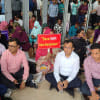NBR officials call off shutdown as govt softens stance

Officials of the National Board of Revenue (NBR) called off their planned shutdown yesterday evening, following a government pledge to transform the board into a "specialised and autonomous agency" rather than dissolving it.
The officials, protesting under the banner of the "NBR Reform Unity Council", had earlier threatened a complete suspension of operations from today unless their four-point demand was met.
In a statement yesterday evening, they welcomed the government's latest commitment, which came after more than a week of demonstrations that paralysed revenue activities across the country.
With the withdrawal of the shutdown, now revenue officials will return to work. In the media statement, the officials mentioned that they would do work outside the scheduled office hours to clear the pending activities accumulated during their demonstration since May 14.
Faced with mounting pressure, the finance ministry yesterday announced that the government would move to establish a specialised revenue agency while protecting the interests of officials from the customs, excise, and taxation departments.
The move marks a further shift in the government's stance, coming just days after the ministry first indicated willingness to amend the Revenue Policy and Revenue Management Ordinance.
The protesters, who began their demonstrations on May 14, have been arguing that the ordinance enacted on May 12 would effectively dissolve the NBR and compromise their job security.
Their dissatisfaction had already led to major service disruptions, including customs clearance delays at key ports and interruptions in tax-related services nationwide.
In its latest statement, the finance ministry said it would finalise the new institutional framework through consultations with the NBR, the Revenue Reform Advisory Committee, and other stakeholders. Amendments to the ordinance are expected by July 31. Until then, the government will not enforce the law.
The ministry said that it hopes the announcement would calm tensions within the NBR and encourage staff to return to duty and focus on revenue collection.
Customs, VAT, and tax officials had been observing work stoppages for several days, leading to backlogs at Chattogram Port, which handles about 90 percent of the country's international trade.
Yesterday, 17 container ships carrying around 500,000 tonnes of goods were waiting at the outer anchorage due to slow clearance.
While export processing was exempted from the work stoppage, customs officers refrained from inspecting imports and issuing clearances between 9:00 am and 5:00 pm in the past two days.
Prior to that, NBR officials observed a daily five-hour strike for five consecutive days till May 19.
The demonstration also hit field offices, delaying services for taxpayers. "Hearings related to tax disputes are not taking place due to the work abstention," said a senior official at a private company yesterday.
Meanwhile, exporters reported knock-on effects.
Syed M Tanveer, managing director of Pacific Jeans, said delays in clearing imported raw materials were slowing production.
"Several export shipments need to be sent before Eid. Significant losses will occur if they don't reach their destination on time," Tanveer said.
To avoid this, he added, they might be forced to resort to air freight, which could increase costs by 15 to 20 times.
Chattogram Port data show that in the five days to May 19, about 4,000 twenty-foot equivalent units (TEUs) of import containers had piled up. Storage at port yards rose to 44,000 TEUs—well above the optimal operational level of 35,000 but still below the maximum capacity of 53,518 TEUs.
Since customs officers resumed work on May 19, the situation has gradually improved.
Muntasir Rubayat, a director of the Bangladesh Shipping Agents Association, said although export documents were being processed, customs officers at port gates were still refusing to sign off on import container exits.
As a result, prime movers transporting containers to inland depots (ICDs) were stuck at the port, creating delays in export movements from ICDs, he added.
Ruhul Amin Sikder, secretary general of the Bangladesh Inland Container Depots Association (BICDA), feared an acute backlog during the upcoming Eid holidays if deliveries did not resume at full pace.
The disruption also affected the readymade garment sector.
Nasir Uddin Chowdhury, former first vice-president of the Bangladesh Garment Manufacturers and Exporters Association (BGMEA), said delays in releasing imported accessories, brought in under back-to-back LCs, could hamper production in factories.
In their media release yesterday evening, the NBR Reform Unity Council said they would do work outside the scheduled office hours to clear the pending activities.

 For all latest news, follow The Daily Star's Google News channel.
For all latest news, follow The Daily Star's Google News channel. 







Comments